Proposing new values for a society transformed by digital innovation
What You Will Study
-
1STYEAR
Learn the basics of programming and content creation
Students acquire a basic understanding of the technological tools used to give shape to ideas and develop the logical composition skills needed to use these tools.They also learn basic computer programming skills.Taking advantage of the features of programming that enable easy collaboration with others, students deepen their practical learning in their topics of interest.Through workshops, students also learn about the production of music and video, approaches to collaborative work, and the characteristics of each medium.
-
2NDYEAR
Choose a course that matches your interest and develop content creation skills
Students pursue their own topics of interest in one of the following courses: Media Technologies, Image Creation, or Sound Creation.In addition to developing their own content creation skills, students also participate in corporate internships, learning how to move society forward and developing ideas for systems that can create new connections and new forms of entertainment.At the same time, students explore their ability to uncover challenges and the pathways to solving these challenges through technology.
-
3RDYEAR
Engage in hands-on projects at companies, government agencies, and other organizations
Students work on projects aimed at solving social issues in collaboration with various companies, government agencies, research institutions, and other organizations, focusing on their own research topics and technological expertise.They also acquire the ability to work together as a team to move projects forward and launch projects that create new value for society and learn how to establish these projects as businesses.
-
4THYEAR
Give form to ideas through a graduation project and present problem-solving proposals to society
Students work on a graduation project, the culmination of their four years of study, giving shape to their ideas and communicating them to others.They leverage the knowledge they have gained through internships and problem-solving courses and combine ideas and technologies to present society with concrete proposals that will help to solve social issues.
In their second year, students select one of Four Courses
-
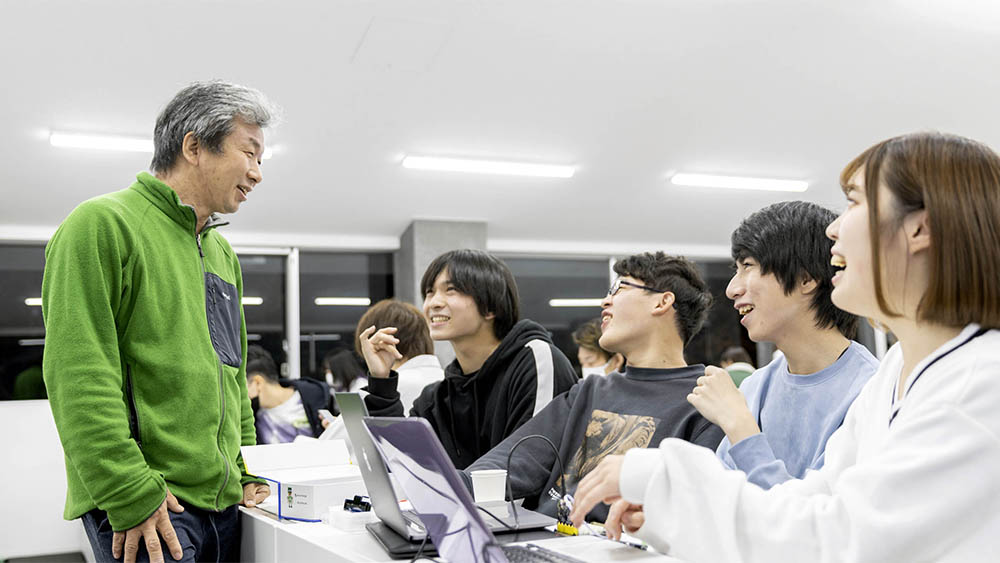
Media Innovation Course
In the Media Innovation Course, UI/UX is at the heart of learning, and students acquire the theory and skills necessary for everything from people-centered service planning to development. While developing skills in digital marketing, design theory, programming, and electronics, students will create socially responsive services and products that help solve the issues we face today. Students also study subjects from a global perspective in light of the current times, where digital services cross national borders. This course aims to cultivate hands-on creators who can pave the way for starting new businesses through means such as web development and 3D printing.
-
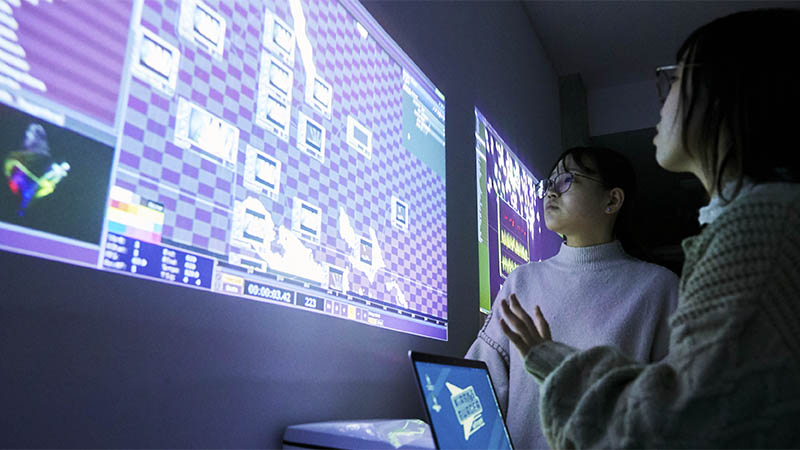
Media Design Course
The Media Design Course is a journey of exploration and creativity. Students are encouraged to design their own media, acquiring a wide range of knowledge beyond visual design. They also learn about the various technologies that support visual expression, including programming, planning and editing, graphic design, video production, electronics, fabrication, and interactive expression techniques. The course allows students to refine their work through a unique process of repeated practice, presentation, revision, and refinement.
-
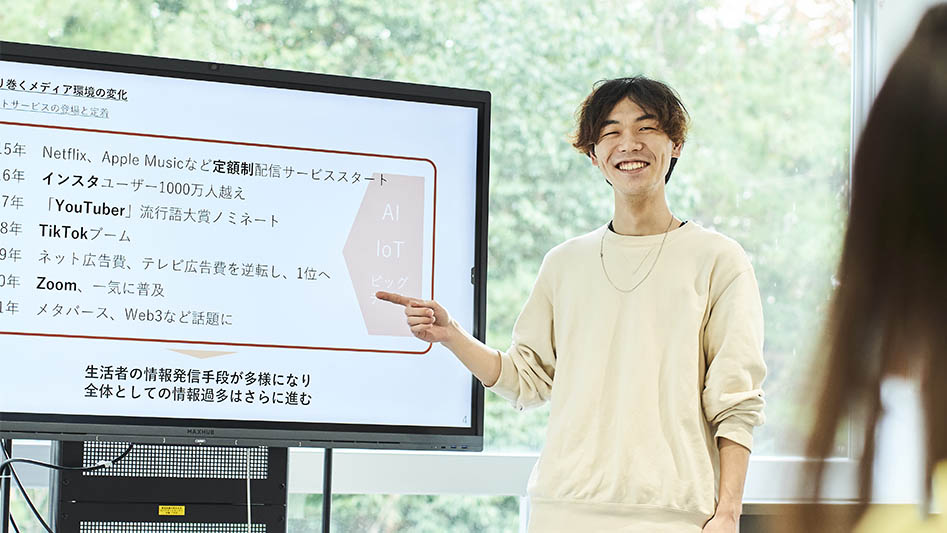
Media Communication Course
In the Media Communication Course, students engage in media planning and content development, studying theoretical concepts and applying them in practical settings to bring their ideas to life. They undertake various research techniques to identify issues, alongside tackling team management and presentations for project execution. This involves real-world communication for event and advertising projects, which are then refined based on actual feedback. This course emphasizes going outside the university to research the field and collaborating with a diverse range of people in companies, government agencies, and the local community.
-
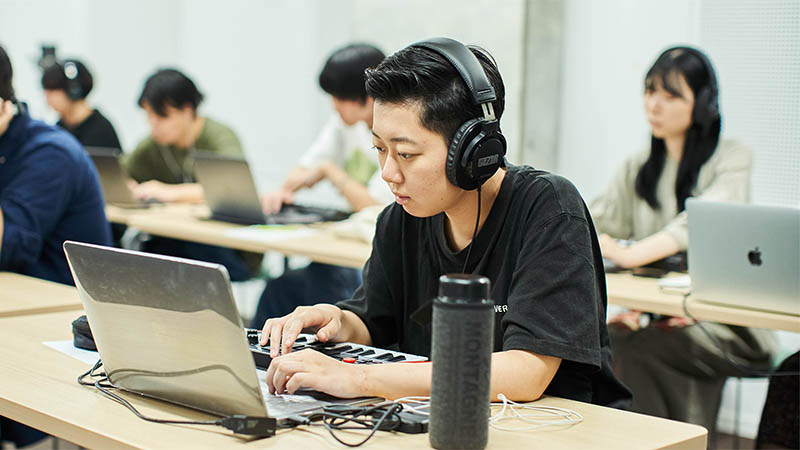
Sound Creation Course
In the Sound Creation Course, students engage not only in traditional music production, such as composition and arrangement, but also in a variety of other areas—including sound design for video games and visual media, electronic music production and sound programming, and the production of soundscapes that take into consideration the surrounding environment. This course emphasizes design thinking, which involves problem-solving in tandem with different disciplines. The focus is not only on creating music but also on developing mechanisms for disseminating music to a broad audience. These include music programming, electronics, and exploring new mechanisms that integrate IoT.
Developing practical skills through learning to solve social issues
-

Externship
Students gain short-term work experience at a company in their chosen field or an industry where they want to expand their skills. These internships help them develop their work ethic, develop their imagination, and hone communication and other soft skills.
-
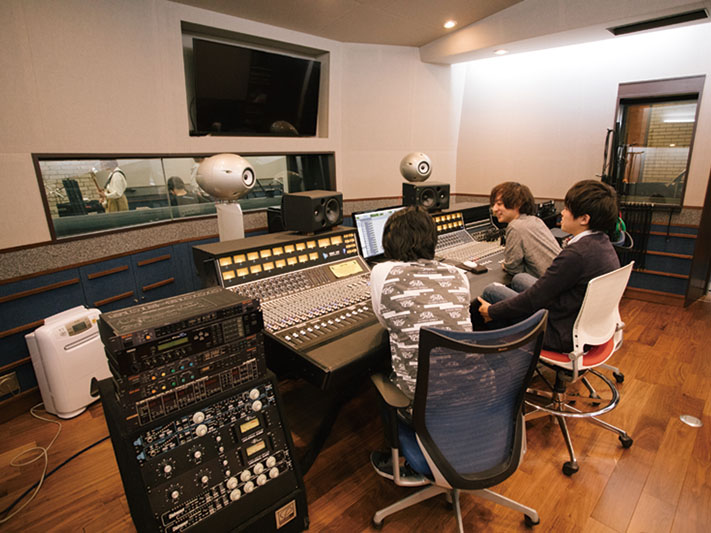
Projects
Students collaborate with companies to implement projects that address social issues.Students develop the ability to understand societal needs and work as a team in every step of the project, from planning to implementation.
Learning Outcomes
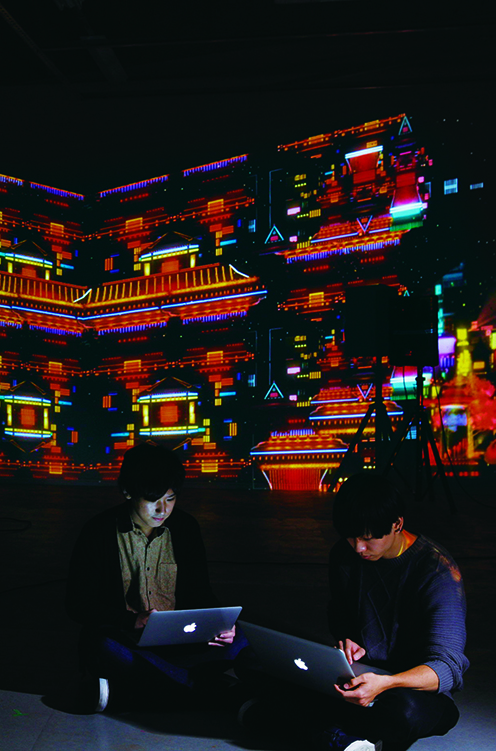
■ Learn to combine cutting-edge technologies to provide new value to society
Students acquire the skills needed to utilize the latest technologies, including programming, AR, VR, and app development, as well as the ability to combine these media to provide new value to society.
■ Engage with society, explore society, and learn technical skills
While still at the Faculty, students participate in collaborative projects with companies, research institutions, and other organizations. These opportunities help them acquire the technical skills they will need to work at the cutting-edge of industry upon graduation. They also equip students with tools for conveying their interests and the ideas they wish to communicate.
■ Find a unique form of expression with the support of experienced academic faculty
Students are taught by professionals active in the field, who create unique content using AI and IoT technologies.They learn about techniques and review case studies from various fields and explore possibilities for their own unique form of expression.
Course Highlights
-
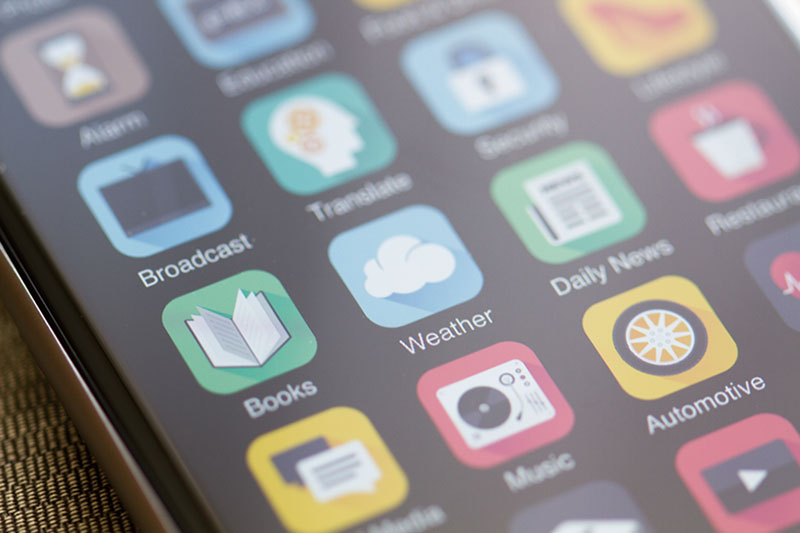
Media Creation Literacy
From familiar objects such as smartphones and computers to video content and music events, students acquire a comprehensive and practical foundation upon which they can understand, apply, and communicate a wide variety of media.
-

Programming
Students learn image processing and HTML, as well as JavaScript, the foundation of programming.They also learn how to handle 3D images by creating mini-games using the 3D engine Unity and practice using Python with AI and robots.
-

Content Business I
Students use case studies to learn about copyright in Japan.They review their basic knowledge and practical understanding of copyright as they learn about the structure of the music industry and the history of copyright in Japan and around the world.Students also consider the payment and allocation of royalties for the use of music.
-
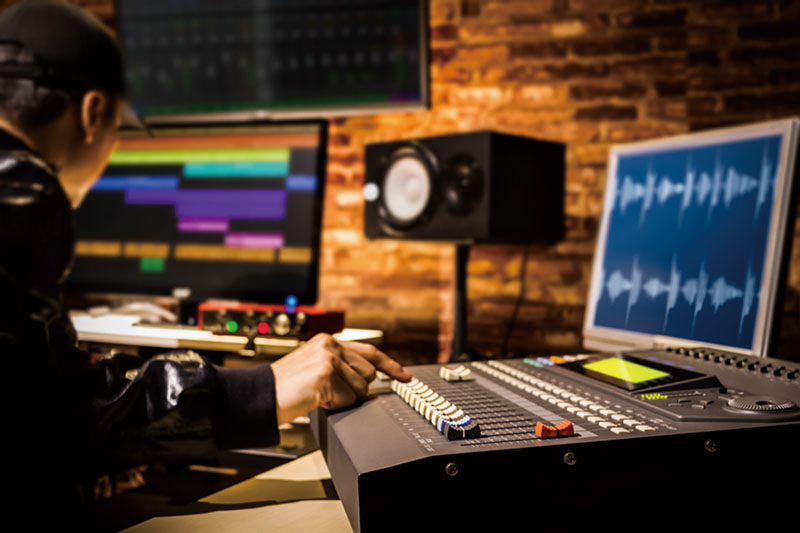
Media Mix Theory
Students focus on the structure of transmedia franchises, where value is created through the interaction of diverse forms of expression, including music, video, animation, games, websites, and events. Students study the impact of these structures on consumers, their function as businesses, and their history.
Careers
- IT-related companies
- Content production companies
- Media-related companies
- Ad-related companies
- Event management-related companies
- Planning / public relations / information departments of general companies
- Entrepreneurship
- Media Creator
- Video Creator
- Acoustic Designer
- CG Designer
- Programmer
and many more
About the Faculty of Media Creation
Voice
-
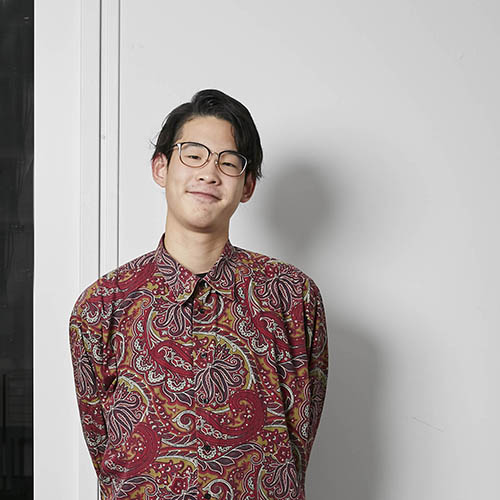
HIRAYAMA Yuuki Current Student Exploring an interest in esports through a second-year internship
I chose the Faculty of Media Creation because it offers traditional classes for learning about information technology, such as programming, and hands-on classes where I get to create videos and other kinds of content. I'm interested in both of those, which made this seem like the perfect faculty for me. Also, before coming to Kyoto Seika, I wasn’t sure which field I wanted to pursue, so I thought I would benefit from being able to study a wide variety of fields in my first year before choosing a major in my second year.One of the first-year classes that left a lasting impression on me was Media Creation Literacy 1, taught by Prof. Takayasu Kuroda. With a long career at the intersection of technology and entertainment, his lectures were always full of interesting insights. I was also captivated by the presentations of guest lecturers who visited our class. Internships start from our second year, and I’m really looking forward to that. It seems like I’ll learn a lot, and I’m excited to experience working at a company and learn what leaders in the industry are thinking about. While taking various classes, I developed an interest in marketing and web development, and in my second year, I plan to major in the Media Technologies Course, which offers a full range of subjects on those topics. I am still thinking about what to do after graduation, but I’m interested in working in the entertainment industry, esports in particular. I want to gather as much knowledge and experience as I can, both on and off campus, to prepare for wherever my career takes me.(Interview held in December of student’s first year) -
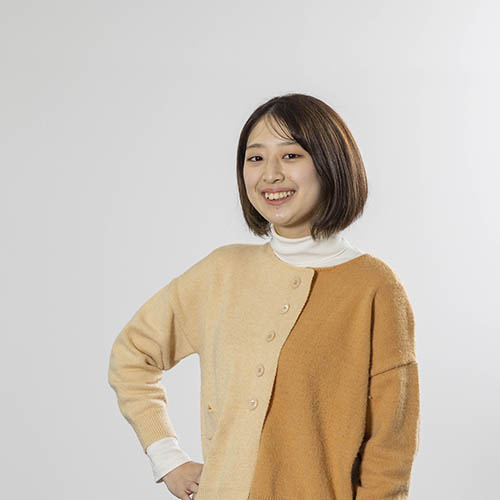
HIROSE Chikari Current Student Distilling a diverse range of study into avant-garde video art
I’ve been interested in filmmaking since high school. What makes the Faculty of Media Creation unique is that students study more than just film itself. We also explore a wide range of related fields by looking at the material from the broader perspective of media. That’s what drew me to Kyoto Seika and this faculty in particular. In fact, the curriculum is made up of classes that cover a wide variety of fields. Since coming to Kyoto Seika, I have been able to try my hand at many different things, like creating sound art, taking pictures, and controlling robots. And, of course, I’ve taken video production classes as well. In one class, we had to create a video montage by combining a bunch of short scenes. At first, I was overwhelmed by the schedule as we had just one week to plan, shoot, and edit the video, but I was also inspired by how creative my classmates were and the works they produced.This past year of studying at the Faculty of Media Creation has had a profound impact on my interest in video and sound, and in my second year, I’m planning to major in the Image Creation Course. In the future, I would like to research sound and how it is used to complement video, such as soundtracks for film and television. However, I don’t want to focus solely on video and sound. I also want to learn as much as I can about other interesting subjects that I may discover during my studies. I think that will allow me to absorb various ideas and techniques in order to create visuals using new methods of expression not bound by conventional formats. I hope that this will allow me to one day create works of art that are inspiring to others.(Interview held in December of student’s first year) -
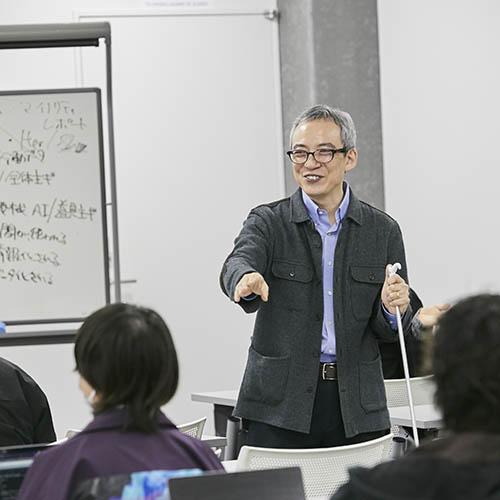
YOSHIKAWA Masataka Academic Faculty Creating new values that will change society
Until now, people may have heard the word “media” and thought of TV or smartphones. But in the age of IoT, when everything is connected to the Internet, home appliances and vehicles will also be mediums for transmitting information. As media diversifies, many new types of content and services will continue to change our lives and transform society as they are created. And the Faculty of Media Creation is educating the people who will create this new world.One thing that makes the faculty unique is its mandatory programming classes. These classes are mandatory because programming knowledge and skills are essential for innovation in an increasingly digital world. However, it is not just about acquiring techniques, which are only a means of solving a problem. You must first have an idea of what you want to achieve or create and then acquire the knowledge needed to achieve your goal.An emphasis on making connections in the community is another thing that sets the Faculty of Media Creation apart. What we call media can only exist when there are people there to receive it, and that information continues to change in response to how people react to it. That is why we encourage students to engage in communication and plan to establish classes and other programs in collaboration with corporations. We hope that students will learn the thrill of engaging with the community, receiving feedback, and incorporating that experience into their work.Once you come to Kyoto Seika, we will challenge you to use media to create new values that will change people and society. There are no restrictions on theme or format, and you may end up revolutionizing the entertainment world by creating never-before-seen visuals or building a groundbreaking service that will help achieve the United Nations’ Sustainable Development Goals (SDGs). At the Faculty of Media Creation, I am committed to helping train the professionals that will be entrusted with shaping the future of Japan and the world.


